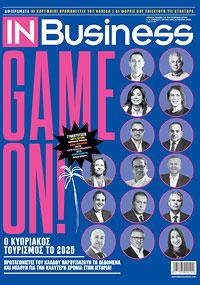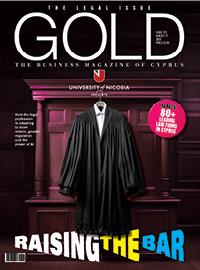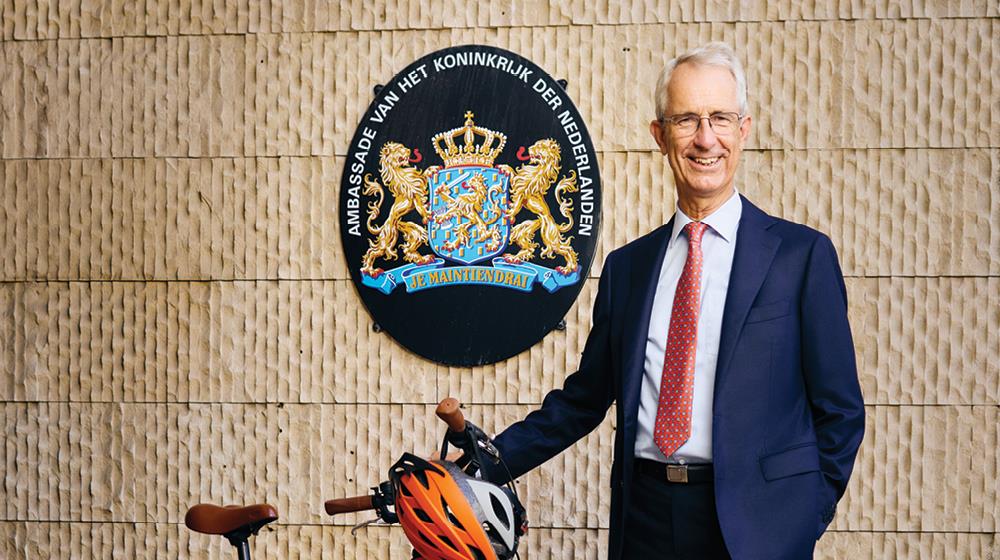"The Netherlands has been very appreciative of the recent evacuation cooperation, by which Cyprus has proven to be a reliable partner with state-of-the-art facilities and resources, thanks to its strategic location close to the Middle East. There’s still scope for expanding and deepening this specific cooperation and I also see great potential in agricultural and environmental cooperation," Wouter Plomp, Ambassador of the Kingdom of the Netherlands to Cyprus reveals.
In a recent interview with GOLD magazine, His Excellency, among other things, shares his views on the island’s adoption of sustainable mobility, the potential for greater collaboration between the two countries and the pleasures of the warm Mediterranean. He also talks about his country's view of current geopolitical events and their potential impact on Europe and the Mediterranean.
How would you describe relations between the Netherlands and Cyprus, and in what areas is there the potential for expansion?
Relations are excellent and actually quite vibrant. It’s a relatively young relationship which was boosted greatly in 2004 when Cyprus joined the EU. The Netherlands has been very appreciative of the recent evacuation cooperation, by which Cyprus has proven to be a reliable partner with state-of-the-art facilities and resources, thanks to its strategic location close to the Middle East. There’s still scope for expanding and deepening this specific cooperation and I also see great potential in agricultural and environmental cooperation, especially since the recent successful visit to the Netherlands by Cyprus’ Minister of Agriculture, Rural Development and Environment, Maria Panayiotou.
This year King Willem-Alexander and Queen Maxima visited Cyprus. How would you evaluate the visit? Can such visits strengthen relations between the two countries?
The first official State Visit of the Netherlands to Cyprus was a great visit – very well-prepared, thanks to the thorough and efficient work done by the Protocol Department of Cyprus’ Ministry of Foreign Affairs. All the official parts of the visit were excellently organised and President Christodoulides and King Willem Alexander had some good conversations, helped by the fact that the President had visited the Netherlands last year.
We agreed from the start that we would use this visit at the highest level to showcase some of the best examples of our cooperation, so we went to the Joint Rescue Coordination Centre (JRCC) in Larnaca to see what Cyprus is doing to help other countries evacuate their nationals from crisis zones. On the same day, we visited the potato fields in Xylophagou where Cypriot farmers use Dutch potato seeds to produce the tastiest potatoes, thanks to the area’s red soil and early growing season. We also visited the old town of Nicosia and the Home for Cooperation where young Greek and Turkish Cypriots meet, and we highlighted our cooperation in archaeology by visiting the Neolithic settlement of Choirokoitia.
As His Majesty the King said, it is in the aftermath of such a visit that the real and substantive work begins. Indeed, this is what we saw during the visit by Agriculture Minister Panayiotou to the Netherlands at the end of June. She was received by her Dutch counterpart, Femke Wiersma, and the two visited the so-called Farm of the Future, Potato Valley and a dairy farm, all examples of innovation and new technology in the agriculture sector, which are also of interest to Cyprus. We are happy that Minister Panayiotou herself praised the hospitality of Dutch policymakers, experts and farmers and showed particular interest in further enhancing the exchange of this knowledge and technology with the Netherlands.
Sustainability is a big part of Dutch culture, from transport and the widespread use of bicycles to enacting Green initiatives in public life. How did the Netherlands develop such a culture?
It’s good to bear in mind that the Netherlands wasn’t always so bicycle-friendly as it is nowadays! I can still remember the 1970s when, as happened in many other European countries, growing prosperity led to more cars, which looked like taking over the cities. Thanks to the foresight of some activists and progressive city governments, that didn’t happen. They joined hands to redesign cities in such a way that cyclists and pedestrians were literally given more space – dedicated bike paths – and so it became much safer to cycle to school as well as being healthier and actually faster.
Some Dutch cities have adopted the so-called 15-minute city concept and other are aspiring to do the same thing. How will this goal change the Netherlands and how can this be applied in Cyprus, where some cities have already started to undertake such initiatives?
While the term “15-minute city” may be relatively new, the principles behind it – walkability, cycling infrastructure and mixed-use neighbourhoods – have shaped Dutch cities for decades. Cities like Utrecht and Amsterdam already allow residents to reach most of their daily needs within 15 minutes, hence the name. Cyprus could benefit from adapting some of these ideas to its own context, especially in smaller urban areas.
Our Embassy has been active in working with different Cypriot stakeholders to promote sustainable mobility. In April we rode our bicycles through Limassol with mobility experts from the Netherlands and local NGOs as well as the people from the municipality. We also participate in bicycle rides in Nicosia, of course. We are happy to observe that a younger generation of Cypriots sees the value of cycling and has been asking for more participation in the processes.
Personally, I believe that cycling in Cyprus could contribute to reducing traffic and improving air quality, while riding a bicycle is also healthy and simply fun. But safe bike paths and good connections are a must. July and August may be hot but, for the rest of the year, the weather here is perfect for riding a bicycle.
What view does the Netherlands have of current geopolitical events, in which escalation could affect Europe and the Mediterranean?
Obviously, the geopolitical climate has changed substantially over the last few years. For the Netherlands, it is clear that we can not face these challenges alone. Europe must grow into a stronger geopolitical and geo-economic player to safeguard our security and prosperity. This affects the whole of Europe, including the Mediterranean.
How do you assess the current political climate in Cyprus and ongoing efforts to restart talks to solve the island’s decades-long division?
I think it’s good news that the talks in New York in July not only took place but will be followed up by other meetings. Given the increased uncertainties due to the changing geopolitical context, it’s high time to overcome the political division of this beautiful island. I think the efforts by the UN Secretary General’s Personal Envoy, Maria Angela Holguin, and the EU Special Envoy, Johannes Hahn, deserve praise as they try to help the parties find common ground, on the basis of a bizonal, bicommunal federation with political equality in accordance with Security Council resolutions and EU values. But, at the end of the day, it is of course up to the Greek Cypriots and the Turkish Cypriots to show the political courage to explore any common ground and be ready to make compromises.
What has your experience here been like so far? How does Cyprus compare with the Netherlands?
My wife and I feel privileged to live in Cyprus, where everyone receives us in such a friendly manner. Workwise, it’s sometimes an advantage to operate in a smaller country where contacts are easy and everyone in the administration goes out of his or her way to accommodate us. It is obviously warmer here than in the Netherlands, so I have learned to appreciate and to make a freddo cappuccino! We enjoy the balmy summer evenings in Nicosia and, of course, we love the beach the whole year round, as the Mediterranean Sea off Cyprus is warmer in January than the North Sea is in August!
(Photo by TASPHO)
This interview first appeared in the August edition of GOLD magazine. Click here to view it.









